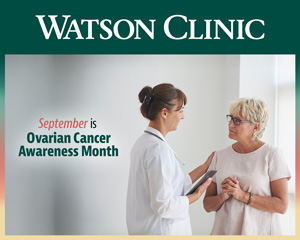
It was once considered a silent disease—often going undetected until it was too late to do much about it.
Now doctors believe that ovarian cancer may cause early symptoms. If you're a woman, it's important to become familiar with them.
The overwhelming majority of women whose ovarian cancers are found and treated early will live five years or longer—and many will live much longer and can even be cured, according to the American Cancer Society (ACS).
Unfortunately, only 20% of ovarian cancers are actually found at an early stage. However, if you know what to look for, you can get the symptoms checked.
The ACS reports the most common early symptoms include:
• Bloating.
• Pelvic or abdominal pain.
• Difficulty eating.
• Feeling full quickly while eating.
• Urgent or frequent need to urinate.
These symptoms are, of course, relatively common. In most cases, they aren't related to ovarian cancer. Still, if the symptoms are new for you, occur almost daily and last for more than a few weeks, they should prompt you to get a checkup, preferably with a gynecologist.
Two out of every three cases of ovarian cancers occur in women 55 years of age or older, but it can occur earlier.
In addition to advancing age, other risk factors include:
• A family history of ovarian, endometrial, breast or colorectal cancer.
• A personal history of breast cancer.
• Being a carrier of a genetic mutation linked to ovarian cancer.
• Obesity.
• Never having children or having a child after age 35.
September is Ovarian Cancer Awareness Month. Ovarian cancer is the fifth leading cause of cancer death in women. You can avoid becoming a part of this statistic if you stay informed and vigilant. Be sure you schedule regular exams with your Watson Clinic OB-GYN by calling 863-680-7243 or clicking here, and voice any concerns you have regarding the symptoms and risks for ovarian cancer. Meanwhile, Watson Clinic's Gynecologic Oncology department specializes in the treatment of ovarian cancer and other gynecologic cancers. Call 863-680-7578 or click here for more information and to schedule an appointment.